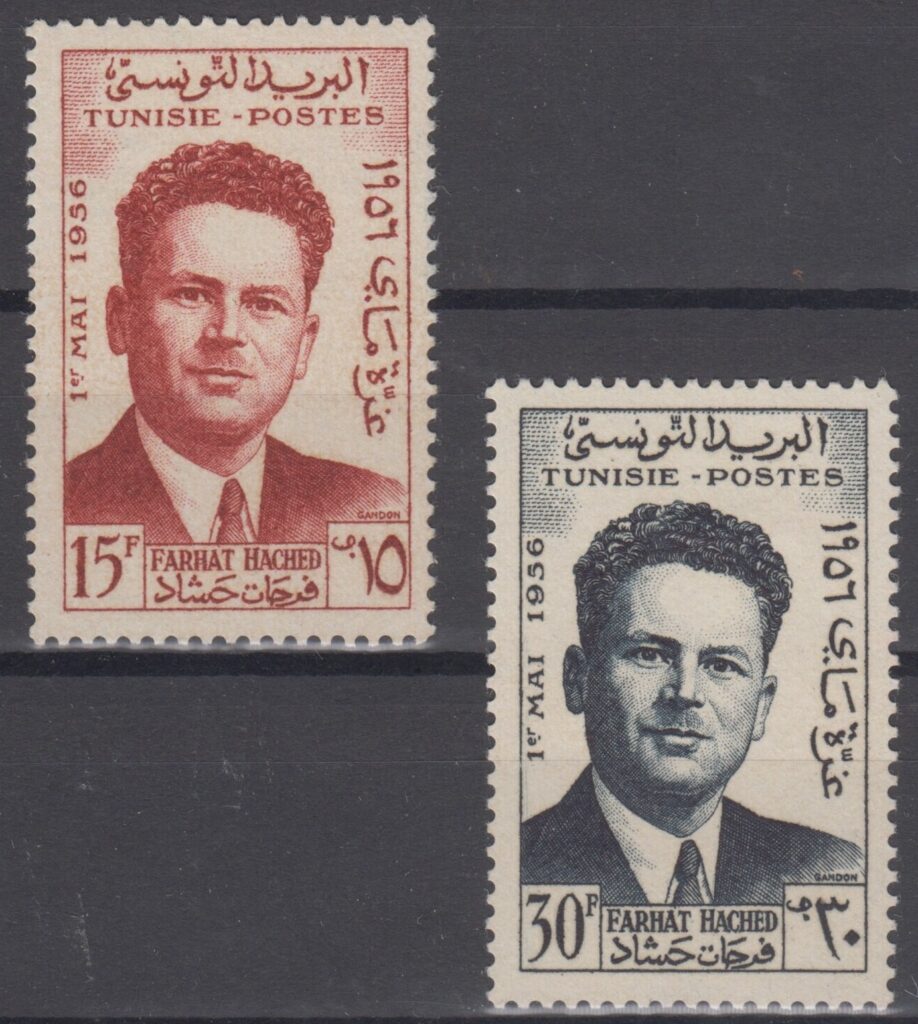In 1956, Tunisia issued a pair of striking stamps commemorating Farhat Hached, a prominent trade unionist and nationalist leader who played a pivotal role in the country’s fight for independence. These stamps, issued on Labour Day (May 1st), honour his legacy as a champion of the working class and a symbol of Tunisia’s anti-colonial movement.
The Stamps: A Symbolic Design
The two stamps feature a portrait of Farhat Hached with the following denominations:
- 15 francs in a red and white colour scheme, symbolizing his revolutionary spirit.
- 30 francs in blue and white, reflecting the calm determination that characterized his leadership.
The bilingual inscriptions include Arabic and French, marking Tunisia’s transition from a colonial past to an independent nation. Designed by the renowned artist Gandon, these stamps were issued as part of Tunisia’s early post-independence philatelic series.
Who Was Farhat Hached?
Born on 2 February 1914 in Kerkennah (Abbasiya), Hached emerged as a leading figure in Tunisia’s independence movement. His contributions include:
- Founding the Tunisian General Labour Union (UGTT) in 1946, which became a powerful voice for the working class and a cornerstone of the independence struggle.
- Advocating for Tunisia’s Independence: Alongside leaders like Habib Bourguiba and Salah Ben Youssef, Hached tirelessly campaigned against French colonial rule.
- Global Recognition: His efforts gained international attention, particularly from labour organizations in the United States and other Western nations.
The Tragic Assassination
On 5 December 1952, Farhat Hached was assassinated near Radès, a suburb of Tunis. His murder was initially attributed to the clandestine pro-colonial group La Main Rouge (The Red Hand), later revealed to have ties to French intelligence services. His death sparked widespread protests and became a rallying point for Tunisia’s independence movement.
Hached’s assassination occurred during a period of intense resistance against French colonialism. While many Tunisian leaders were imprisoned or exiled, Hached’s growing influence among international labour unions provided him with a degree of immunity. Unable to silence him through legal means, French authorities orchestrated his assassination, a shocking act that underscored the desperation of colonial forces.
The Stamps’ Historical Significance
Issued in 1956, the year Tunisia achieved independence, these stamps were a powerful tribute to Hached’s contributions:
- Commemorating a National Hero: As one of the first commemorative issues of independent Tunisia, they symbolize the nation’s gratitude to Hached’s legacy.
- Labour Day Connection: The release on May 1st highlights Hached’s role as a labour leader and his fight for workers’ rights.
- Philatelic Milestone: These stamps marked Tunisia’s early efforts to establish its identity through philately, celebrating its heroes and milestones.
Farhat Hached’s Legacy
Today, Farhat Hached is remembered as a national hero and a martyr for Tunisian independence. Streets, institutions, and monuments across the country bear his name, ensuring his legacy remains alive in the hearts of Tunisians.
Share Your Thoughts
Have you encountered these stamps in your collection, or do you own other philatelic items honouring Tunisia’s independence movement? Share your stories in the comments below! Don’t forget to subscribe for more insights into the world of stamps and postal history.


